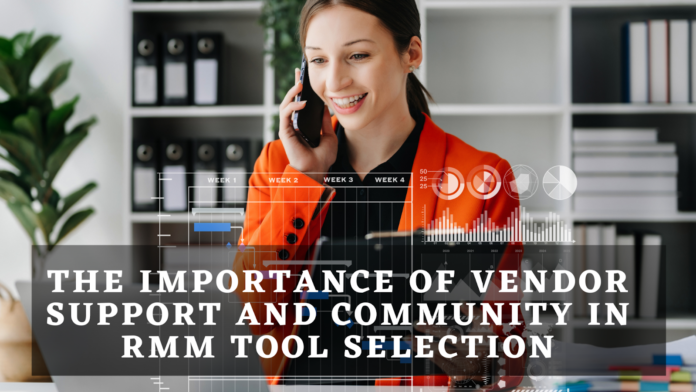Last Updated on January 11, 2026 by Rida Gul
Choosing the right RMM tool? Look beyond features. Selecting the right remote monitoring and management (RMM) tool is one of the most important decisions an MSP or IT organization can make.
Robust vendor support and an active user community are essential pillars for long-term success. Evaluate RMMs based on a complete solution – strong technical capabilities combined with an ecosystem for knowledge sharing and user-driven innovation.
In this blog post, we will explore the importance of vendor support and an active community as indispensable pillars that elevate RMM tools and ensure long-term success for users.
Table of Contents
The Direct Impact of Vendor Support on RMM Tool Effectiveness
The support provided by an RMM vendor has a tremendous influence on the tool’s performance and user satisfaction. Comprehensive technical support, training resources, and prompt software updates/maintenance from the vendor enable you to get the most value from the RMM platform.
The Critical Nature of RMM Tool Technical Support
Timely access to qualified technical support can make the difference between smooth operations and costly downtime. Technical support for RMM tools plays a crucial role in:
Troubleshooting and quickly resolving technical issues
- Identifying root causes of monitoring failures or false alerts
- Suggesting fixes for integration problems with PSA, backup, AV, and other tools
- Debugging scripting/automation errors to restore functioning monitoring
- Guiding to mitigate faulty probe readings or hardware issues
- Directing users to the right logs and system information for efficient diagnosis
- Answering questions on functionality and usage
- Guiding complex configurations and monitoring setups
Having technical support equipped with the knowledge to remotely troubleshoot or guide users through diagnosis, and to rapidly pinpoint solutions, maintains uptime and productivity.
Choosing a vendor with a reputation for responsive, knowledgeable support ensures you have a safety net when you need it. Investigating track records of quick issue resolution and positive user reviews of support interactions reduces reliance on forums for troubleshooting RMM tools, complementing community knowledge.
60% of IT professionals rely on vendor support channels as a go-to resource when troubleshooting technical issues. Quality technical support can provide the rapid solutions needed to minimize disruptions for monitored devices and networks.
The Importance of RMM Tool Training Resources
Although RMM tools aim to simplify IT management, they still have a learning curve. RMM tool training resources like onboarding assistance, documentation, webinars, and videos are invaluable for rapidly gaining proficiency.
Vendors who invest in education position users for success with RMM tools by:
- Accelerating time-to-value with the platform
- Reducing reliance on technical support
- Enabling users to get the most from the tool’s capabilities
The Security Imperative of RMM Software Updates and Maintenance
Regular software updates and maintenance are crucial for an RMM tool’s security and stability. Vendors who rapidly roll out patches, feature updates, and version upgrades help users:
- Stay ahead of emerging threats with the latest protections
- Access new capabilities to enhance RMM tool performance
- Avoid stability/compatibility issues that disrupt monitoring
Carefully evaluate a vendor’s commitment to continuous improvement through updates and maintenance.
The Transformative Power of an RMM Community
An engaged user community enhances the RMM tool experience in pivotal ways beyond vendor support. From troubleshooting help to product influence, the community creates an ecosystem for knowledge sharing and collaboration.
Peer-to-Peer Support and Troubleshooting
RMM tools inevitably involve challenges from misconfigurations, complex environments, and false alerts. Engaged RMM communities enable valuable peer-to-peer support through public forums and discussions, allowing collective troubleshooting.
Active communities are essential for peer assistance with RMMs. Although ConnectWise touts intelligent alerting cuts false positives by 80%, a GoTo study found only 37% of SMB IT leaders can self-heal RMM issues, showing the need for community knowledge.
Peers share fixes for stubborn monitoring and hardware problems, guiding optimization. Community experience fills gaps, preempting problems through collective wisdom. Evaluating engagement ensures access to this support channel alongside vendor teams.
Shared Best Practices and Insights
Every user of an RMM tool has valuable experience and tips to share. Within communities, they have a place to document their RMM tool best practices and insights, creating a knowledge base that benefits all users.
Common challenges faced by the community can be preempted by applying proven guidelines and solutions.
User-Driven Innovation and Feature Requests
By sharing feedback on their pain points and desired capabilities, engaged users directly influence RMM software development. Vendors gain insight into which new features would have the biggest impact.
An RMM tool shaped by those who use it daily evolves to better meet the community’s needs.
Key Considerations for Evaluating Vendor Support and Community
When selecting an RMM tool, assessing both the vendor support and user community attached to a product is just as crucial as evaluating its technical capabilities. Here are key aspects to examine:
Vendor Support
- Availability: Are support teams available 24/7 or only during business hours?
- Responsiveness: How quickly do they resolve tickets and respond to requests?
- Expertise: Do they demonstrate extensive product knowledge when assisting users?
- Commitment to user success: Is customer satisfaction a clear priority in their interactions?
User Community
- Activity level: How often do users post discussions and engage with each other?
- Knowledge sharing: Is user-generated content prevalent, such as guides/tutorials?
- Value added: Are there community-driven initiatives, events, or projects beyond forums?
- Vendor involvement: Does the vendor actively participate in and engage the community?
Thoroughly investigating these factors will reveal whether a tool has an engaged ecosystem and support framework or an apathetic community and support experience.
Choose an RMM Partner, Not Just Software
RMM tools are a long-term investment whose value depends greatly on the vendor’s post-purchase support and community participation. Beyond evaluating technical capabilities, carefully gauge the support ecosystem and community around an RMM solution.
Vendor support keeps your monitoring running smoothly while an engaged community enhances every user’s experience. When these foundations are solid, an RMM becomes a partnership that adapts and grows rather than just another software subscription. Use the guidance in this post to select a complete RMM tool that takes care of its users now and into the future.
Now that you understand the critical nature of vendor support and community in RMM tools, the next step is exploring your options. Request demos and trials from top solutions to evaluate the technical power, support model, and community engagement around meeting your unique monitoring needs.
FAQ: Common Vendor and Community Questions When Selecting RMM Tools
Deciding between RMM solutions often raises questions about comparing vendor support models and community engagement. Here are answers to some frequently asked questions:
To meet monitoring and management needs, RMM technical support is essential 24/7 with quick response times. Knowledgeable support staff and access to senior/escalated support indicate expertise.
Look beyond the presence of forums to the quality of discussions. Resources like wikis, guides, and blogs highlight engaged users. Robust peer assistance and integrations/plugins developed by the community demonstrate real involvement.
Vendors play a key role but cannot completely compensate for an unengaged community’s absence. Peer insights fill knowledge gaps and drive user-centric innovation. Evaluate tools strongly on both fronts.
Prioritize RMM vendors by providing thorough release notes, knowledge bases, live/recorded webinars, and both general and role-based courses. On-demand access allows self-driven learning while documentation keeps users up to date.
Having the right information to accurately evaluate vendor support and community engagement is key to choosing an exceptional RMM platform.
Apart from that if you want to know about “How to Choose a City for First-Time Home Buyers: Offering Affordability and More” then please visit our “Business” Category.


























